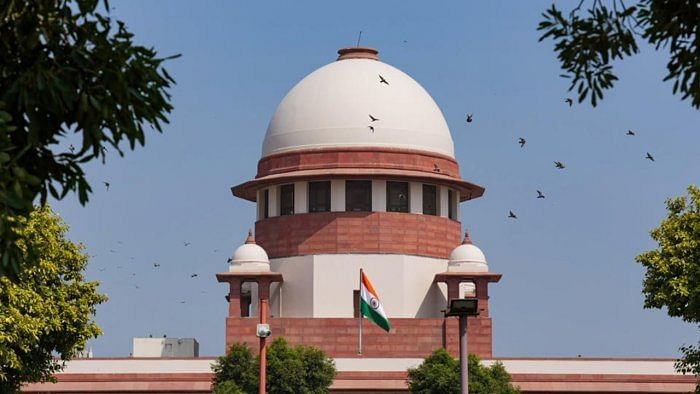
The Union government has opposed before the Supreme Court maintainability of plea to recognise same-sex marriage by asking if a constitutional court can legislate to create a separate socio-legal institution of marriage between persons not contemplated by the existing legislation.
"A decision by the Court in recognising the right of same-sex marriage would mean a virtual judicial rewriting of an entire branch of law. The Court must refrain from passing such omnibus orders. The proper authority for the same is appropriate Legislature," it contended.
On Monday, Solicitor General Tushar Mehta mentioned the fresh application filed by the Centre before a bench presided over by Chief Justice of India D Y Chandrachud which allowed it for hearing on April 18 along with other similar applications by the state governments.
In an application, the government claimed the petitions which merely reflect urban elitist views cannot be compared with the appropriate legislature which reflects the views and voices of far wider spectrum and expands across the country.
The Centre further asked if the constitutional court should interpret the existing legislation in such a way that it destroys the fundamental fabric of the existing legislations which necessarily presuppose a marriage between a biological man and a biological woman.
"While creating an institution like marriage, which is essentially a socio-legal concept, is it not constitutionally imperative to leave the question to the appropriate legislature which represent the democratic mandate," the Centre asked in its plea.
The Supreme Court's five judge bench led by Chief Justice of India D Y Chandrachud is scheduled to take up the batch of petitions for recognising same-sex marriage from April 18.
The government maintained only the appropriate Legislature can decide the issues based on societal ethos, societal values and larger societal acceptability in the Indian context of understanding of marriage as an institution.
"The creation or recognition of a new social institution altogether, cannot be claimed as a matter of right/choice, much less a fundamental right. Therefore, it necessarily follows that the right to personal autonomy does not include a right for the recognition of same-sex marriage and that too by way of judicial adjudication," it said.
The government further maintained that marriage is considered to be an aspect of social policy of the nation across the world.
"It is within the remit of the appropriate legislature, as the elected representatives of the people, to define it, recognise it and regulate it and the choice not to recognise same-sex marriage is simply a facet of the legislative policy," it said.
The government also cautioned the ripple effects of such decisions are difficult to anticipate.
"Under the scheme of our Constitution, the Courts do not replace the policy of Legislature with its own. The exercise should only be “what is the law” and not “what the law should have been”, it said.
The government further said it is not discrimination to grant recognition to heterogenous institution of marriage alone to the exclusion of same-sex marriage.
"Given the clear legislative policy and the compelling state interest underlying heterogenous institution of marriage, the Courts should refrain from addressing the issue. The question of what marriage ought to be is a normative one and requires to be addressed by Parliament. It not a dispute fit for the Court to adjudicate upon," it said.
Additionally, the principles of marriage, inheritance, succession etc are all social norms which have been given the sanction of law which are also governed by personal laws. The personal laws of any nation necessarily depend upon what that nation’s society considers apposite. India is no exception. Given the fundamentally social origin of these laws, any change in order to be legitimate would have to come from the bottom up and through legislation," it added.
